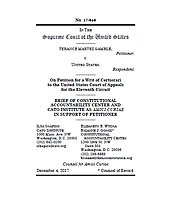Learn more about Cato’s Amicus Briefs Program.
Terance Gamble was convicted of second-degree robbery in Alabama in 2008. That’s a felony, so he was barred from possessing a firearm under both federal and state law. Seven years later, Gamble was pulled over for a broken taillight. Smelling marijuana, the police officer searched the car and found, among other things, a 9mm handgun. Alabama prosecuted Gamble under its “felon-in-possession” statute and he was ultimately sentenced to a year in prison. Concurrent with the state’s prosecution, however, the U.S. attorney charged Gamble with the same offense under federal law. He was sentenced to 46 months in prison and will be released early in 2020, nearly three years after he would have been released from state prison. At both the trial and appellate level, Gamble argued that the federal prosecution violated his Fifth Amendment right against being placed twice in jeopardy for the same crime. But given the “dual sovereignty” exception to that Double Jeopardy Clause, which the Supreme Court created 60 years ago—the idea that federal and state prosecutions have to be counted separately—the courts had to ignore that objection. Cato has joined the Constitutional Accountability Center in filing a brief urging the Court to review Gamble’s case and overturn this misguided exception—as we’ve done before in Walker v. Texas and Tyler v. United States, which presented the same issue. We make three principal arguments. First, none of the Framers would have contemplated such a large exception to Double Jeopardy protection. Even before the Founding, English jurist and legal theorist William Blackstone wrote that it was considered a “universal maxim of the common law of England, that no man is to be brought into jeopardy of his life, more than once, for the same offense .” And in congressional debates before the enactment of the Fifth Amendment, Rep. Roger Sherman observed that “the courts of justice would never think of trying and punishing twice for the same offence.” Second, the practical magnitude of the dual-sovereignty exception is much greater today than it was 60 years ago. For most of our nation’s history, the federal government left most criminal matters to be handled by the states; there were relatively few offenses punishable by both authorities. But in recent decades, there has been “a stunning expansion of federal criminal jurisdiction into a field traditionally policed by state and local laws,” as Justice Clarence Thomas wrote in dissent in Evans v. United States (1992). Now that nearly every state crime has a federal analog, the dual-sovereignty exception risks entirely swallowing the Double Jeopardy rule. Finally, the Supreme Court created the dual-sovereignty exception a decade before it held that the Double Jeopardy Clause fully applies to the states. Now that we know that it does, there’s no reason why a state prosecution shouldn’t “count” when a defendant objects to having been prosecuted twice. As Justice Hugo Black once put it, also in dissent, “If double punishment is what is feared, it hurts no less for two ‘Sovereigns’ to inflict it than for one.” Bartkus v. Illinois (1959). The Court should take this common-sense advice and put an end to the misguided dual-sovereignty exception, at least as it works in practice in modern times.
